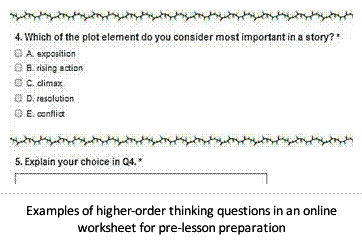| I. Topic |
Flipped Classroom: facilitating deeper learning and cultivating 21st century skills in S4 through the Drama elective module |
| |
| II. Level |
| S4 |
| |
| III. Purpose |
The project focused on improving the design of the existing school-based Drama elective module so as to make room for:
- further improving the students' confidence, fluency and performance in speaking English
- deepening their learning of the topics covered
- enhancing their innovation, critical thinking and communication skills and creativity,
- developing their positive value and attitude such as collaboration, self-direction, adaptability, accountability and responsibility; and
- developing their e-learning skills so that they could develop confidence and competence in using some e-learning tools and other e-learning resources to learn and collaborate with their peers.
|
| IV. Characteristics of the module design |
| 1. |
The flipped learning approach |
| |
The flipped learning approach was adopted in nearly all the lessons in the revised Drama module. Students were required to learn the lesson content before they returned to class so that the time originally spent on unidirectional teaching in class could be used to engage them actively in task-based learning activities that promoted their deeper learning and high level thinking skills. |
| |
| 2. |
Tasks to encourage deeper learning and reflection outside class time |
| |
Deeper learning was facilitated through the pre-lesson preparation tasks and the requirements set in the after class group reflection log. These were accessed via the class drama websites. |
| |
i. The pre-lesson preparation tasks
| Nearly all the pre-lesson preparation tasks had three components |
| a. |
input in the form of videos or texts, for students to learn the content; |
| b. |
questions which required students to justify their opinions; and |
| c. |
a platform for students to raise questions they still had concerning the content. |
|
 |
| |
These three components formed the basis of the higher order thinking activities in class, such as in-depth discussions for them to draw conclusions on different views and creative drama activities for them to apply the newly acquired knowledge and skills. |
| |
|
| |
ii. Group reflection log to be completed after class
Deeper learning was also encouraged after lessons. After class, students used an online group reflection log to share their insights on the topic and respond to each other's opinions and questions. The reflection log was a shared Google Doc that allowed them to learn collaboratively in real-time. |
| |
|
| 3. |
Interactive and collaborative activities |
| |
Apart from higher order thinking skills, the flipped drama module also focused on fostering students' other 21st century capabilities such as communication and collaboration skills. Students were always engaged in team work and collaborative learning activities, such as group presentations, drama performances in groups and provision of peer feedback in this module. A lot of their collaboration involved the use of information and communications technology. |
| |
|
| 4. |
Various e-learning tools and resources |
| |
i. e-learning tools and platform
A number of e-learning tools, such as Google Docs, Google Sites, Google Forms and Quizlet, were adopted in the design of this module. They not only helped students learn the lesson content and develop their collaborative and technology skills, but also facilitated the more effective use of class time.
| a. |
Google Form, online videos and Quizlet flashcards were used to create the online worksheets for the pre-lesson preparation tasks. By referring to students' responses and questions raised in the online worksheets, teachers could be better informed of their mastery of the lesson content and questions they still had about it before class so that they could prepare their feedback and design active learning activities that facilitated deeper learning during lessons. |
| b. |
Google Docs were used as a platform for students to write in groups and to discuss their work whenever was convenient for them according to their schedule. Google Docs were also used for keeping a group reflection log. |
| c. |
Google Sites were used to host the pre-lesson preparation tasks for students' easy access. Guidelines to raise their awareness of how they should manage the long term tasks, such as their group's original play production and portfolios, and additional resources on acting and explanation on the use of e-learning tools for self- instruction were also made available on the class's drama website to enhance students' self-directed learning skills. |
|
|

|
| 5. |
Shared expectations and success criteria |
| |
Since students were new to flipped learning and their active participation both in and outside the classroom was necessary for them to benefit from the approach, the nature of the new approach and the importance of completing the pre-class independent learning assignments were explained to them explicitly at the beginning of the module. The learning objectives and the ways in which students were expected to demonstrate their understanding of the target knowledge and skills were also clearly stated in each pre-class independent learning assignment. |
| |
|
| V. Assessment tools |
- Teachers' observations and feedback
- Students' feedback and reflections made in questionnaire and reflection log
- Students' work
|

